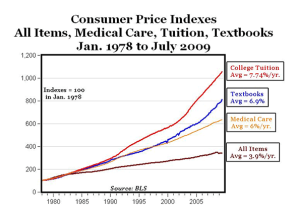[ Ramsin Canon is one of the most keen left political observers I know in Chicago. Among other things he's been the politics editor at Gapers Blocks, a union organizer, and is now a law student I believe. Needless to say, he's no fan of "neoliberalism", even when practiced by those on the left. Here he provides his frame and critique of the current reigning governance model in our various levels of government re:cities. I may revisit this topic with my own thoughts in the future, but I'd like to make a couple of observations here. 1) Canon sees … [Read more...]
The Tough Realities Facing Smaller Post-Industrial Cities
A couple weeks ago the Economist ran a leader and an article on the plight of smaller post-industrial cities, noting that these days the worst urban decay is found not in big cities but in small ones. They observe: Partly, this reflects the extraordinary success of London and continuing deindustrialisation in the north of England. Areas such as Teesside have been struggling, on and off, since the first world war. But whereas over the past two decades England’s big cities have developed strong service-sector economies, its smaller industrial … [Read more...]
Using Placemaking to Serve the Needs of Industry
[ Quality of place improvements tend to be targeted at high end demographics downtown and such. In this piece Rod Stevens and Gregory Tung talk about how the needs of industry for better quality places should not be overlooked - Aaron. ] In a recent posting on “The Promise and Peril of Rust Belt Chic” Aaron Renn contrasts the goals of self-affirmation with the Richard Florida approach of hipster havens. There is a division here between creating jobs and place-making, a gulf that has never been bridged between economic gardening and New … [Read more...]
Asking the Wrong Question On Amenities
The Indianapolis Star ran a major article on Sunday that provides a view of the new suburban reality facing many place in America. Called "Amenities reflect Indianapolis suburbs' new goals" it describes the efforts of various suburbs around Indy to move away from purely a schools/rooftops/retail model of the suburb to one that offers other amenities such as first class parks, New Urbanist town centers, arts venues, etc. Incidentally, the five or so featured are all completely run by Republicans, showing again that local level Republicans today … [Read more...]
Boston: Whither Somerville?
[ Urbanophile reader Andrew Zimmermann sends us this tale of change in Somerville, a suburban town near Boston - Aaron. ] Urban planners have long cast the artist and gay/lesbian communities as urban pioneers and harbingers of gentrification. We’ve heard the stories of North Halsted in Chicago, the Pearl District in Portland, the South End in Boston and Soho/Chelsea in Manhattan. But, ever since hipsters became part of the sub-culture lexicon, urban experts have blamed gentrification on them. From Williamsburg, Brooklyn to the Mission in San … [Read more...]
Making the Link Between Quality of Life and Economic Development
A rather prosaic economic development announcement in Indianapolis provides an opportunity to hammer home in a concrete way the connection between quality of life investments and economic development. This is something I've long argued we urbanists do a poor job of. We tend to adopt a "build it and they will come" marketing approach to quality of life initiatives where the connection between cause and effect is tenuous. Additionally, these tend to focus almost entirely on and tell stories about "the best and brightest" which in a country dying … [Read more...]
What Is a Global City?
This post originally ran on August 19, 2012. We hear a lot of talk these days about so-called "global cities." But what is a global city? Saskia Sassen literally wrote the book on global cities back in 2001 (though her global cities work dates back well over a decade prior to that book). She gave a definition that has long struck with me. In short form, in the age of globalization, the activities of production are scattered on a global basis. These complex, globalized production networks require new forms of financial and producer … [Read more...]
The End of the Road for Eds and Meds
This post originally appeared in New Geography on September 12, 2012. In the last few decades, as suburbanization and deindustrialization devastated so many cities, they turned to two sectors that seemed not only immune to decline, but were actually growing: universities and hospitals. The so-called “eds and meds” sectors, often related through university affiliated hospitals, became a great stabilizer for many places. For example, the fabled Cleveland Clinic cushioned the blow of manufacturing decline in that city. Après steel, a city like … [Read more...]
Will Las Vegas’ Downtown Project Succeed?
This is the second installment in my look at the Las Vegas Downtown Project. In part one I gave an overview of the project and some of the positives and success indicators. On Thursday I looked at some of the commonalities between Vegas and other small cities as a bridge to this installment. And finally today I want to look at some of the challenges I see with the Downtown Project and ask, will it succeed? As for the answer to that question, some of it is a matter of how you define success. At a base level, there's already been success. … [Read more...]
Tony Hsieh and the Las Vegas Downtown Project
The Downtown Project in Las Vegas, an attempt to completely reinvent downtown Las Vegas spearheaded by Zappos CEO Tony Hsieh, is one of the better known downtown revitalization initiatives in America. I've been planning to write on it since I saw Tony speak about it in Providence last fall. I was kicked in the pants to finally do so by a trip I took to Vegas last week to check the Downtown Project out. Before going any further, I should disclose that I stayed there for free in one of the project's "crash pad" apartments (more on those … [Read more...]
- « Previous Page
- 1
- …
- 7
- 8
- 9
- 10
- 11
- …
- 18
- Next Page »


